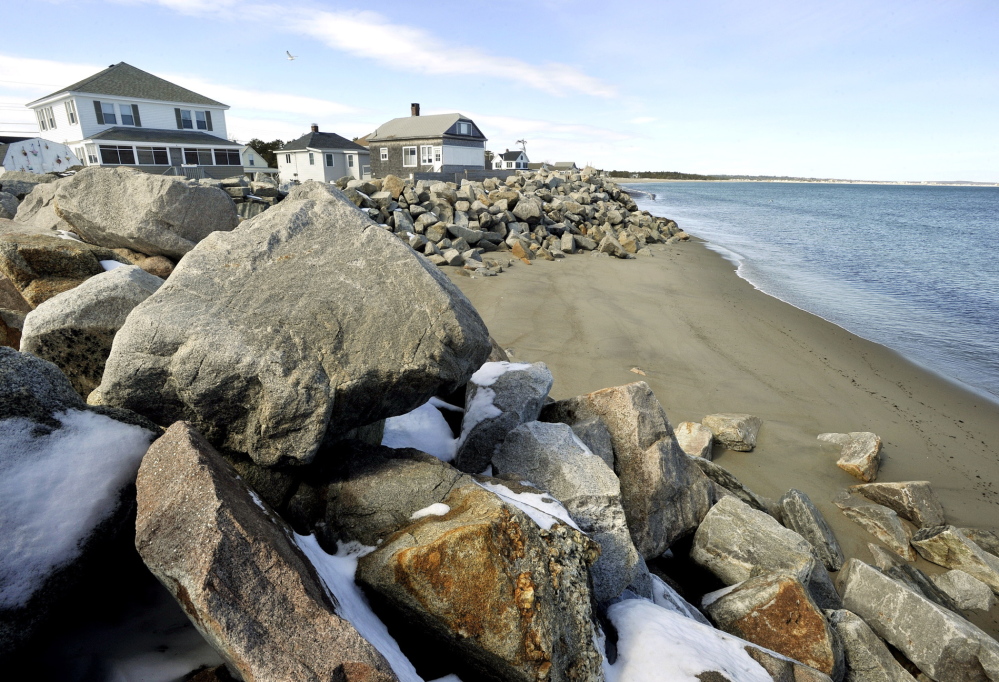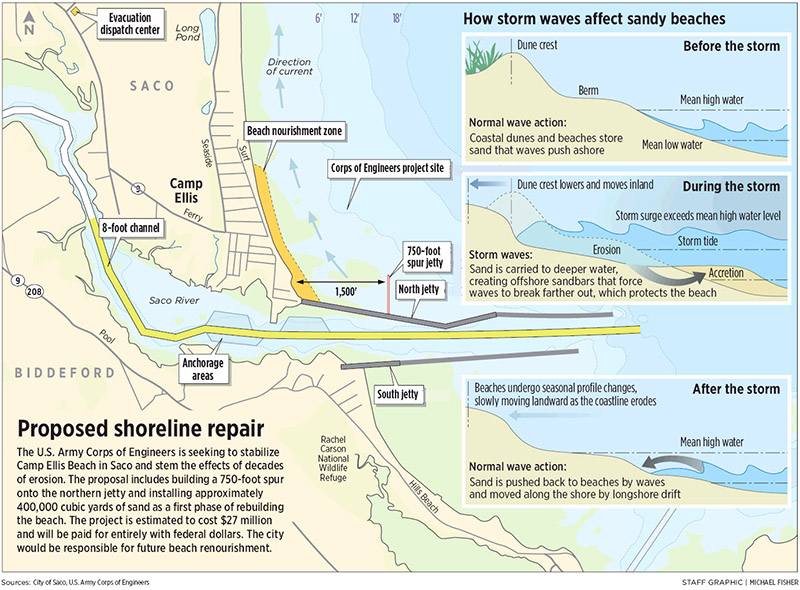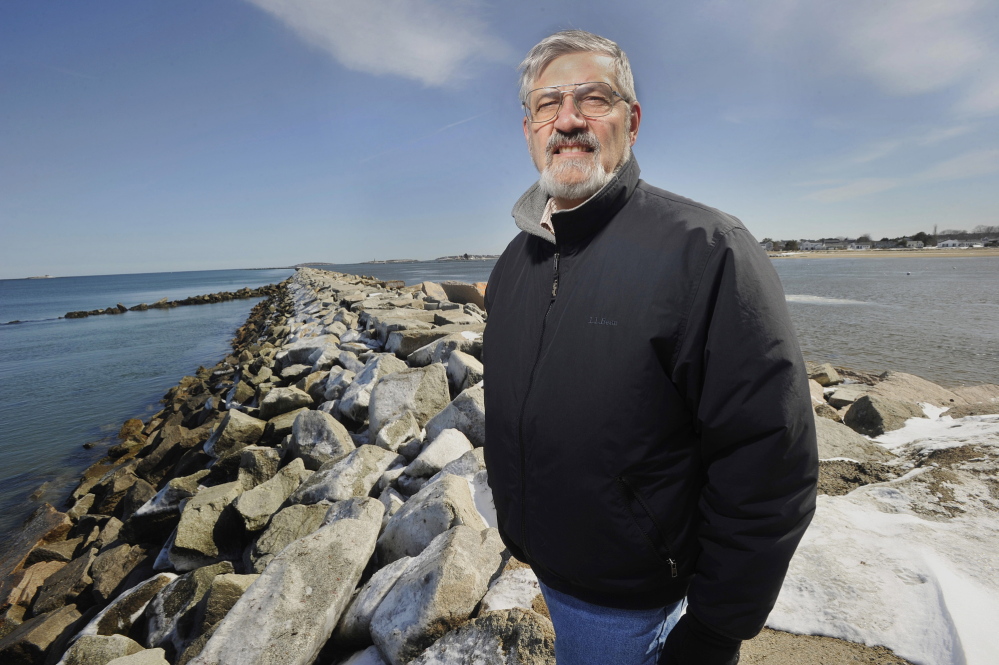Saco city officials fear that concerns about wildlife protection and the shifting of beach sand could cause delays in a long-awaited $27 million project to stop destructive shoreline erosion and restore the beach at Camp Ellis.
Representatives from the U.S. Army Corps of Engineers and the U.S. Fish and Wildlife Service will meet this week to discuss the Camp Ellis project and questions raised about how it will affect endangered birds and sand movement along the shoreline. City officials fear the questions could lead to more studies and a push for the City Council to approve a local beach management plan, which could include restrictions on recreation and on unleashed dogs.
Some worry that the concerns about protecting wildlife habitat that doesn’t even exist yet could delay or even derail the project.
“The people down here are just exhausted and they’re beside themselves,” said Saco Mayor Don Pilon. “Every time we have a storm that comes up the coast, we brace ourselves in anticipation. We hope it’s not a major storm that takes another house away. The city spends thousands of dollars every winter to Band-Aid the problem. We can’t go on like this.”
DISAGREEMENT ON HABITAT RISK
The Army Corps’ Camp Ellis Shoreline Damage Mitigation Project is designed to stop beach erosion caused by the jetty built more than a century ago at the mouth of the Saco River, and to restore the sand beach, which right now is under water.
The jetty was built to open the area to more commercial fishing, but it altered the dynamics of wave action, currents and sand drift, subjecting Camp Ellis to extremely high tides and serious damage during storms. The beach itself has eroded over time, and streets and nearly 30 houses have washed into the sea.
City officials and coastal residents have pushed for the Army Corps to address the issue for the past two decades.
Now, after 15 years of study and 35 proposals, the Army Corps has developed a plan to install a 750-foot spur on the northern arm of the jetty and place 360,000 cubic yards of sand on the beach north of the jetty. Beach nourishment would be done about every 12 years to maintain the sandy area.
Before the project can move forward, the corps must consult with the federal wildlife service because the area is considered a habitat for the endangered piping plover and the red knot, a small bird that is being considered for threatened species status.
Red knots stop at the jetty to feed during their annual migrations, and piping plovers have been known to nest several miles north of Camp Ellis. A replenished beach could attract piping plovers in the future, according to wildlife officials.
A U.S. Fish and Wildlife Service field supervisor, in a January letter to the Army Corps, said the department “does not concur with (an Army Corps) determination that this project is not likely to adversely affect listed species.” The wildlife service has asked for information about a range of topics, including what type of sand would be brought to the beach, how it would get there and how that sand might move up the coast over time to potentially impact piping plover habitat on other beaches.
Laury Zicari, the wildlife field supervisor who wrote the January letter, said she still has many questions about the environmental assessment the corps did last April.
“We just need a complete analysis of all parts of the project and how it could affect piping plovers and red knots,” Zicari said.
Representatives of the two federal agencies will meet Wednesday, and Zicari said she is hopeful the wildlife service will get the information it needs about the project plans.
Tim Dugan, a spokesman for the Army Corps in New England, said “the corps will continue to coordinate with state and federal resources as needed.” He said the corps is still reviewing its final report on the project.
“We continue to press forward and move the project along toward completion,” he said.
CITY TRIES TO HEAD OFF DELAYS
Saco officials are not sitting idly as they wait for the federal agencies to share information and move forward.
Recently they met with Gov. Paul LePage to discuss their concerns about potential delays, and they would like Secretary of the Interior Sally Jewell to visit Camp Ellis to learn more about the need for the project.
Adrienne Bennett, a spokeswoman for LePage, said the governor is looking into the issue and may send a letter to Jewell inviting her to Maine.
“As Saco waits by for this federal project to come to fruition, this is the last type of delay we wanted to see,” said Patrick Fox, Saco’s director of public works. “As we lose coastline and possibly more homes, we do not need even a six-month delay.”
Richard Michaud, the city administrator, said he believes the questions about sand migration could lead to delays, but the concerns about endangered birds could also pose a significant issue for the city.
There have been no piping plover nests on the beach in Camp Ellis in recent years because there is no beach, Michaud said. But federal wildlife officials say once it is replenished, the beach could attract piping plovers. They also say the project could affect the beach as far north as Old Orchard Beach and Scarborough, where piping plovers generally nest each year.
That is enough for city officials to feel the pressure to come up with a plan to protect the birds, but city officials say a plan that would satisfy the federal government could require “significant” changes to the way local beaches are managed.
The city’s Shoreline Commission has been working since fall on a beach management plan intended to protect piping plovers, least terns and red knots. Protection measures in the plan include restricting kite flying and volleyball around nesting birds, and guidelines for beach cleaning and vehicles on the sand.
The City Council must approve the beach management agreement before it goes into effect, and city officials say it could be months before a final draft is ready for them to consider.
The management plan will require an agreement between the city, the Maine Department of Inland Fisheries & Wildlife and the U.S. Fish and Wildlife Service. Provisions in the agreement that restrict activities on the beach would be triggered only if nesting activity is confirmed in the area.
DOGS ON THE BEACH AN ISSUE
Much of Saco’s coastline is privately owned, and the state and federal wildlife services also have suggested the city get easements on private property to allow for better protection of the birds, Michaud said.
One of the biggest potential issues with a beach management plan could be the city’s rules regarding dogs on the beach. U.S. Fish and Wildlife Service guidelines state that dogs should be leashed at all times on piping plover nesting beaches, but Saco’s current rules would allow dogs on the beach off-leash.
Pilon, the mayor, said he is especially concerned with the beach management plan.
“I think the federal wildlife service is throwing a monkey wrench in the process,” he said. “We’ve lost close to 40 houses since the jetty was built and miles of road and infrastructure. We’ve been basically trying to Band-Aid this thing until the Army Corps puts that spur in to mitigate the problem.”
Zicari, the federal wildlife field supervisor, said the agency’s questions about wildlife protection will not necessarily delay the project. The agency is only seeking the information needed to evaluate the effect on endangered birds, she said.
The federal wildlife service is not requiring Saco to implement a beach management plan, although it recommends it, and it is not standing in the way of the Army Corps plan, Zicari said.
“It’s unfortunate this hasn’t been smoother, but it’s not our place to stop the project,” she said. “It’s in everybody’s best interest to have a good (beach management) plan. I truly hope the town can develop a plan.”
Regardless of what’s going on with federal and city officials, Camp Ellis resident Rick Milliard would like to see the management plan continue to move forward.
Milliard has lived in Camp Ellis for most of his life and has been actively involved in pursuing a fix for the past 15 years. He serves on the commission that is working on the draft beach management plan.
Milliard said he and other coastal residents are worried that the project could be delayed, but he also understands there is a consultation process among the federal agencies.
“This project has been a series of hurdles right along,” he said. “The problem has persisted for a long time. Hopefully we’ll get to the end of it here before too long.”
Gillian Graham can be contacted at 791-6315 or at:
Twitter: grahamgillian
Send questions/comments to the editors.







Success. Please wait for the page to reload. If the page does not reload within 5 seconds, please refresh the page.
Enter your email and password to access comments.
Hi, to comment on stories you must . This profile is in addition to your subscription and website login.
Already have a commenting profile? .
Invalid username/password.
Please check your email to confirm and complete your registration.
Only subscribers are eligible to post comments. Please subscribe or login first for digital access. Here’s why.
Use the form below to reset your password. When you've submitted your account email, we will send an email with a reset code.